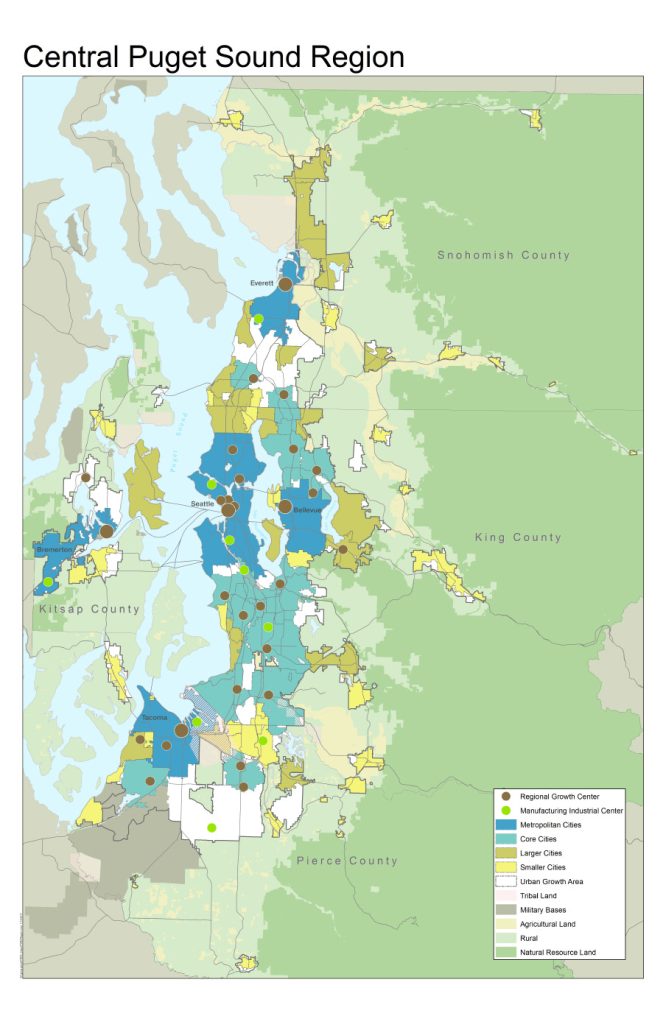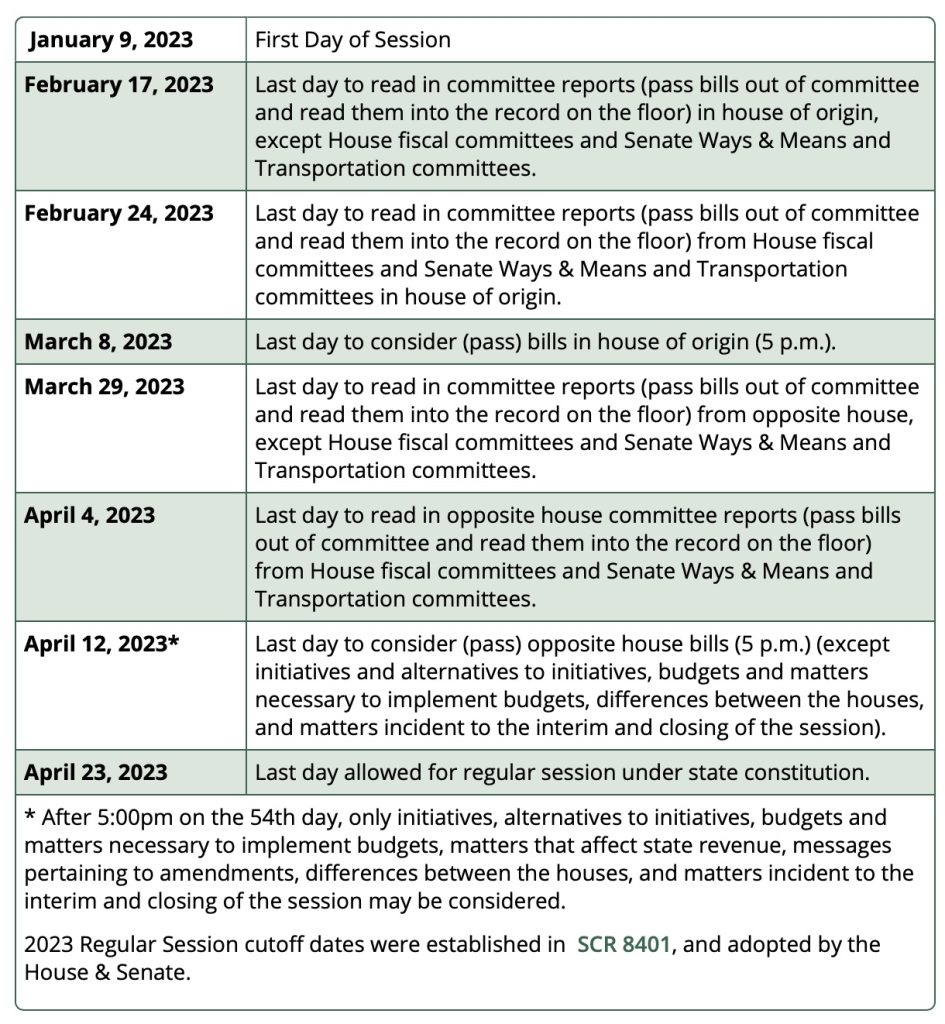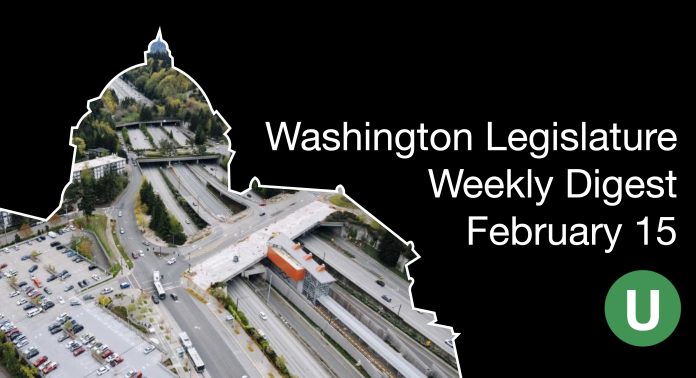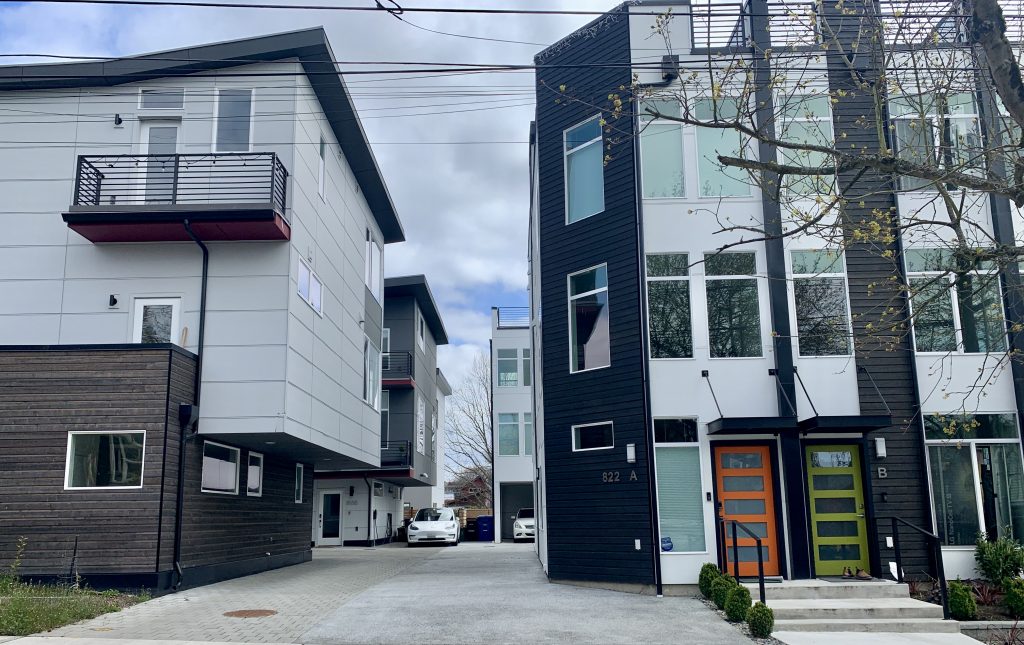In this WALeg report, we look at the progress that’s been made by housing bills, brewing opposition, update other legislation, and listen to the ticking legislative clock.
- Also in this digest:
- Important Bills at a Glance
- This Week’s Focus: What is the “Policy Cutoff”?
HB 1110 and HB 5190 are out of committee with amendments and brewing opposition.
Substitute bills for the legislature’s missing middle legislation – HB 1110 and its senate companion SB 5190 – were approved by their respective committees last week. Clearing their first committee avoids a procedural deadline on Friday February 17, known as policy cutoff, wherein non-budget-related bills die if they have not cleared a committee vote. Senate transportation bills also are given a longer leash.
HB 1110 will still need to pass out of Appropriations committee and SB 5190 out of Way and Means to reach their respective floor votes, but it is a foothold of progress.
The substitute bills, here for HB 1110 and here SB 5190, rewrite the original legislation to address amendments and compromises made to get the bills through committee. Two major changes pertain to which jurisdictions must allow increased density, and were the legislation will change parking minimums.
The legislation now creates two population thresholds for increasing density requirements. Cities with a population over 75,000 or within a contiguous urban growth area (UGA) with a city over 200,000 people must authorize development of at least four units on every residential lot and six units within a half mile of major transit. For cities with a population between 25,000 and 75,000, they must authorize at least two units per residential lot or four units within a half mile of major transit, major parks, or schools.
The upshot is that nothing about the legislation changes for cities contiguous to Seattle, a series of jurisdictions which stretches from Marysville to Joint Base Lewis-McChord and from Puget Sound to Sammamish and Black Diamond. This definition of contiguous is likely to be resisted by towns who are covered by the UGA, but whose municipal boundaries don’t quite touch, like a Mill Creek or DuPont.
As the original legislation applied to all cities over 6,000, the real change is for the 40 or so municipalities between 6,000 and 25,000 people but outside of a major growth area, who would no longer be obligated to increase density. Since Spokane exceeds 200,000 in population, it’s urban growth area would be in the same boat as Seattle’s. Vancouver is still below 200,000 — just over 192,000 at last count by the Census bureau — so smaller Clark County cities wouldn’t fall under the heightened density requirements for contiguous cities.

The substitute bills also remove strong language about reducing or eliminating parking requirements. It is a small change, allowing one or two parking spaces per unit instead of per lot. However, the change could be a six-fold increase in parking for a sixplex naturally, which is the opposite of walkable density. Watering down parking bills is a broader trend this session, as Ryan Packer pointed out over at PubliCola.
The substitute bills also charge Washington’s Department of Commerce with a number of tasks including developing guidance to assist cities in parking studies and publishing a model missing middle housing ordinance. Commerce is the clearinghouse for directions on completing planning tasks, including comprehensive plans and learning how to be on a municipal planning board.
These changes to the legislation aside, the push is on to move HB 1110 out of the legislature and it is supported by public opinion. The pro-housing thinktank Sightline Institute reported this week that support for increasing density has only grown among Washingtonians, with 71% of likely Washington voters supporting legislation to eliminate single-family zoning. It tracks the poll’s finding that 72% of voters see housing shortage as a major cause of housing unaffordability. This exceeds last year’s Sightline polling by almost 10%. A Seattle-only poll commissioned by the Seattle Metropolitan Chamber of Commerce found a similar result last fall.
Of course, more opposition is starting to appear. As covered two weeks ago, there is the standard opposition from corners like Seattle Rep. Gerry Pollet who gutted the bill last year and the Seattle Times editorial board who is just afeared of any housing policy different than what’s existed for the last century.
These persistent voices are being joined by Mercer Island State Senator Lisa Wellman (D – LD41). In response to constituent emails supporting HB 1110, the senator’s aide responded “Senator Wellman is generally against any preemption of city rights, especially when it comes to housing. Knowing we have large, expensive homes within the 1/2 mile of the light rail, there isn’t a feasible way multi-family unit preemptive zoning would be acceptable for her. Also, ADUs and mother-in-law housing are already allowed with most, if not all, municipal codes in our district.”
While the latter point is accurate, it omits the tiny detail that two imminent Link stations – Mercer Island and South Bellevue – are in her district as well as future light rail expansions to Issaquah. Pitting billions of dollars in public transit investment versus “large, expensive homes,” then choosing the exclusionary, climate-delaying McMansions, announces Senator Wellman an early contestant for this year’s Legislative Zeroes short list.
Wellman’s opposition suggests the vote in the state senate could be tight, with some moderate Democrats like Issaquah Senator Mark Mullet also hard to rely on and only one Republican (Minority Leader John Braun) officially signed on as a co-sponsor. Democrats control the senate by a 29-20 margin, following a pickup in the 2022 election. If they have Braun’s vote, they can lose up to five Democrats and still pass the bill.
Important Bills at a Glance
- HB 1110 – Missing Middle
- HB 1181 – GMA Climate Change provisions
- HB 1045 – Evergreen Basic Income pilot
- HB 1026 – Local Government Design Review Reform
- HB 1131 – WRAP Act (bottle deposit and packaging reform)
- HB 1040 – Aviation and Aerospace Advisory Committee
- SB 5466 – Promoting Transit Oriented Development
- SB 5383 – Concerning Pedestrians Crossing and Moving Along Roadways
- HB 1124 – Protecting Tenants from Excessive Rent and Related Fees
- HB 1388 – Protecting Tenants By Prohibiting Predatory Residential Rent Practices
- HB 1389 – Residential Rent Increases Under the Landlord Tenant Act
HB 1110/SB 5190 – Increasing Middle Housing In Areas Traditionally Dedicated to Single Family Detached Housing
- Lead Sponsors: Rep. Jessica Bateman (D – Olympia) and Sen. Yasmin Trudeau (D – Tacoma)
- Link: the House Bill, the Senate Bill
- Description and Notes: Missing middle housing legislation allowing fourplexes everywhere zoned single family and sixplexes near transit
- Current Status – HB1110: Feb. 7 – Substitute bill passed out of Housing committee, referred to Appropriations. – See above for details.
- Current Status – SB5190: Feb. 8 – Substitute bill passed out of Housing committee, referred to Ways and Means – See above for details.
- Resources: In addition to the info above, check out last week’s WALeg Wednesday pierce the thin arguments against the bills and The Urbanist’s team breakdown of this very important legislation.
HB 1181/ SB 5203 – Improving the State’s Response to Climate Change by Updating the State’s Planning Framework
- Lead Sponsor: Rep. Davina Duerr (D – Bothell) and Sen. Liz Lovelett (D – Anacortes)
- Link: the House Bill, the Senate Bill
- Description and Notes: Reintroduction of last session’s HB 1099, a bill to compel jurisdictions to put climate change provisions in their Comprehensive Plans.
- Current Status – HB1181: Feb 9 – Substitute bill passed out of Appropriations
- Changes to wildfire prone area buffers
- Inserts level of service standards for transportation facilities
- Changes to Commerce’s role in GHG emissions reduction approval process
- Current Status – SB5203: Feb 9 – Substitute bill passed out of committee.
- Feb. 10 – Referred to Ways and Means
- Resources: Please see December’s Meetup with Futurewise and Futurewise’s campaign page.
HB 1045 – Creating the Evergreen Basic Income Pilot Program
- Lead Sponsor: Liz Berry (D – Seattle)
- Link: the House Bill
- Description and Notes: Monthly payment equal to the county’s fair market rent at the time of application for 7,500 pilot recipients. Kicks off July 1, 2024. Eligible: adults with income less than 200% of the federal poverty level with transitions or conditions associated with high economic instability: pregnant, kid under five, homeless, immigrant, refugee, asylee, exiting foster care or justice system, domestic violence, disability, or behavioral health disorder.
- Current Status: Jan. 24 – Substitute bill passed out of Human Services, Youth, & Early Learning with amendments to collect demographic information and hire 3rd party program evaluator.
- No change since Jan. 26 – Referred to Appropriations
- Resources: We have a South Park pilot of Guaranteed Basic Income, and Scientific American’s recent look at Universal Basic Income.
HB 1026 – Local Government Design Review Reform
- Lead Sponsor: Amy Walen (D – Kirkland)
- Link: the House Bill
- Description and Notes: Limits design review for housing to administrative design review and drops public meetings by external boards. Has the potential to overcome predatory delays by removing the local power to require public meeting design review for housing.
- Current Status: Jan. 19 – House Committee on Housing, majority recommends passing substitute bill that carves out an exemption, allowing design review for historic districts.
- Jan. 23 – Referred to Rules 2 Review.
- No change since Jan. 24 – Rules Committee relieved of further consideration. Placed on second reading.
- Resources: The Urbanist’s coverage of Seattle’s need to overhaul design review and the first tacit steps.
HB 1131 – Improving Washington’s Solid Waste Outcomes (WRAP Act)
- Lead Sponsor: Berry
- Link: the House Bill
- Description and Notes: Producer responsibility for packaging and paper products, postconsumer recycled content requirements, bottle deposit standards, and amendments to solid waste management.
- Current Status: Feb. 2 – Substitute bill passed executive session in the House Committee on Environment & Energy
- Extends timelines for implementation
- Adds exempt materials
- Lowers performance measures
- Feb. 7 – Referred to Appropriations.
- Feb. 15 – Scheduled for public hearing in the House Committee on Appropriations.
- Resources: Here is the substitute bill. Check out Ashli Blow’s article introducing us to the Washington Recycling and Packaging Act (WRAP Act) and the need for it now.
HB 1040 – Aviation and Aerospace Advisory Committee
- Lead Sponsor: Walen
- Link: the House Bill
- Description and Notes: Aerospace and aviation advisory committee putting together a list of the industry’s strengths and needs for the Secretary of Transportation. Lots of representation on the committee from aerospace and aviation, but only one rep from a “statewide environmental organization.” The committee’s consideration of greenhouse gases is item F after expansions and tech considerations.
- Current Status: No change since Jan. 11 – Scheduled for public hearing in the House Committee on Innovation, Community & Economic Development, & Veterans at 8:00am.
- Resources: A very extensive article from the Journal of Air Transport Management a bout the outsize impact that aircraft have on greenhouse gases and the possibility of net-zero business models, should that be a higher-than-F level priority.
SB 5466 / HB 1517 – Promoting Transit Oriented Development
- Lead Sponsors: Marko Liias (D – Edmonds) and Rep. Julia Reed (D – Seattle)
- Link: the Senate Bill, the House Bill
- Description and Notes: A bill requested by the Governor’s Office that acts as a complement to HB 1110’s missing middle push. Encourages denser housing near rapid transit.
- Current Status – SB 5466: Feb. 8 – Referred to Transportation.
- Feb. 13 – Public hearing in the Senate Transportation.
- Current Status – HB1517: Jan. 23 – First reading, referred to Housing.
- No change since Feb. 7 – Public hearing in the House Committee on Housing.
- Resources: The Urbanist did a big breakdown of the bill from January and also has done a little coverage of transit-oriented development (TOD) in the past. And some good info on this TOD bill from Sightline Institute.
SB 5383 / HB 1428 – Concerning Pedestrians Crossing and Moving Along Roadways
- Lead Sponsors: Sen. Rebecca Saldaña (D – Seattle) and Rep. Emily Alvarado (D – Seattle)
- Link: the Senate Bill, the House Bill
- Description and Notes: Concise and to the point. “A pedestrian may cross a roadway at any point unless a reasonably careful person would realize there is an immediate danger of a collision with a moving vehicle, a person operating a bicycle, or personal delivery device.” Then it supersedes all local rules to the contrary.
- Current Status – SB5383: Jan. 16 – First reading, referred to Transportation.
- Feb. 13 – Public hearing in Senate Transportation.
- Current Status – HB1428: Jan. 18 – First reading, referred to Transportation.
- Feb. 8 – Public hearing in the House Committee on Transportation.
- Resources: See WALeg Week 2 – Weekly Focus with the troubling origins of “jaywalking” and the ways removing these laws makes the streets safer.
HB 1124 – Protecting Tenants from Excessive Rent and Related Fees
- Lead Sponsor: Strom Peterson (D – Lynnwood)
- Link: the House Bill
- Description and Notes: A landlord may not increase the rent paid by a tenant in an amount greater than 5% above the base rent without providing written notice between 180 and 220 days before the increase takes effect. First month and security deposit fees may not exceed one month’s rent. Brings the state in line with Seattle’s 180 day notice requirement.
- Current Status: Jan. 26 – Substitute bill passed out of committee with amendments to clarify when rent includes utilities.
- No change since Jan. 30 – Referred to Rules 2 Review
- Resources: See WALeg Week 3 – Weekly Focus with the difference between rent stabilization bills like these and the misnomer “rent control” that gets dropped pejoratively against any sort of benefit for renters.
HB 1388 – Protecting Tenants by Prohibiting Predatory Residential Rent Practices
- Lead Sponsor: Nicole Macri (D – Seattle)
- Link: the House Bill
- Description and Notes: A landlord or trailer park property owner may not:
- Increase to an excessive rent
- Charge more burdensome rent or fees between month-to-month or longer
- Charge move in fees or security deposits more than one months rent.
- Gives the State AG power to enforce with civil penalties. Excessive rent is defined as the greater of 3% or inflation up to 7%.
- Current Status: Feb. 9 – Executive action taken in Committee on Housing – Passed Substitute Bill that:
- Removes references to “predatory.”
- Changes excessive rent prohibition to include forcing moves and avoiding protections.
- Extends exemption period from 10 to 12 years for new buildings.
- Clarifies AG’s authority.
- Resources: See WALeg Week 3 – Weekly Focus with the difference between rent stabilization bills like these and the misnomer “rent control” that gets dropped pejoratively against any sort of benefit for renters.
HB 1389/SB 5435 – Residential Rent Increases Under the Landlord Tenant Act
- Lead Sponsors: Alex Ramel (D – Camano Island), Trudeau
- Link: the House Bill
- Description and Notes: Landlord may not increase rent more than the rate of inflation as measured by the consumer price index or 3%, whichever is greater, up to a maximum of 7% above the existing rent. Exceptions for less than 10-year-old buildings, public housing, improvements beyond maintenance, and a hardship exemption. Also creates a “banked capacity program” where, with notice, the landlord can skip increases and store up to 3% per year.
- Current Status HB1389: Feb. 9 – Executive action taken in Committee on Housing to pass Substitute Bill that includes:
Extending exemption period from 10 to 12 years for new buildings. - Changes the banked capacity to 10% rate increase and notice clarifications.
- Current Status HB1389: Feb. 9 – Executive action taken in Committee on Housing to pass Substitute Bill that includes:
- Feb. 14 – Referred to Appropriations.
- Current Status SB5435: Feb. 10 – Executive session in Senate Committee on Housing, no action taken.
- Feb. 17 – Scheduled for executive session in the Senate Committee on Housing.
- Resources: See WALeg Week 3 – Weekly Focus with the difference between rent stabilization bills like these and the misnomer “rent control” that gets dropped pejoratively against any sort of benefit for renters.
This Week’s Focus: What is the Policy Cutoff?
With its limited schedule and budgets, Washington’s Legislature cannot afford complete sets of pants, so they have to resort to cut-off jeans through the extended session. The individual legislator can decide the length of the cut, legislative decorum rules require them to be above the knee but prevent full Daisy Dukes.
While this would be entertaining, sometimes, this is also untrue. The legislature’s real cutoffs are self-imposed schedule milestones for moving bills through the limited calendar. The first is on Friday, February 17.

By this weekend, any bill from a policy committee must have been voted out of committee in its house of origin and read on the floor of the chamber. Policy committees are those that are not budget or transportation, so this week’s deadline impacts housing, education, public safety and many others.
There are five more cutoffs scheduled for the legislative session starting with next week’s fiscal committee cutoff. By March 8th, bills need to be out of their house of origin, then the process flips to the other chamber.
The broad impact is that non-transportation and non-budget bills that don’t get out of committee by this weekend are done for the year. Unless the supporters can finagle a way to have them appended to another bill or the budget, the topic will not be considered until 2024.
The specific impact of the policy cutoff is that we will likely be following fewer bills (and potentially a couple new ones) in next week’s WALeg round up. Enjoy mid-winter break (and potentially cutoffs in sunny weather) for those who celebrate, or are not in the legislature.
Ray Dubicki is a stay-at-home dad and parent-on-call for taking care of general school and neighborhood tasks around Ballard. This lets him see how urbanism works (or doesn’t) during the hours most people are locked in their office. He is an attorney and urbanist by training, with soup-to-nuts planning experience from code enforcement to university development to writing zoning ordinances. He enjoys using PowerPoint, but only because it’s no longer a weekly obligation.



